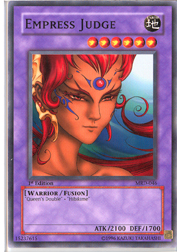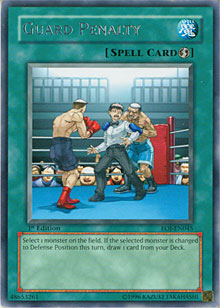 Hello everyone, and welcome back to Solid Ground! It’s been a while since this column last made an appearance here at Metagame, so we’ve got a lot of catching up to do. For the next while, I’ll be focusing on player responsibility issues — while I was away, I came up with quite a few topics that are overdue for some in-depth exploration. Today, I’m offering a detailed explanation of two processes that many players are unfamiliar with: Disqualification and Suspension.
Hello everyone, and welcome back to Solid Ground! It’s been a while since this column last made an appearance here at Metagame, so we’ve got a lot of catching up to do. For the next while, I’ll be focusing on player responsibility issues — while I was away, I came up with quite a few topics that are overdue for some in-depth exploration. Today, I’m offering a detailed explanation of two processes that many players are unfamiliar with: Disqualification and Suspension.
Since I doubt any player wants to learn about disqualification or suspension firsthand, my goal here is to explain each term and give a better understanding of how these processes work. Ideally, players would never engage in behavior that can result in disqualification, but since disqualifications happen, it’s a topic worth discussing.
First off — let’s actually define these terms. I often hear players using them interchangeably, but in truth they’re two different things. Using one where you mean the other leads to misunderstanding, so listen up.
Disqualification:
A penalty given out for serious infractions (called "Conduct Unbecoming") at an event. The player is no longer enrolled in the tournament, and he or she is usually removed from the premises. Depending on the infraction, the player may or may not receive prizes. This penalty can only be handed out by the head judge of the tournament.
Warnings, game losses, and match losses are not disqualifications. A player may continue to play after receiving any of these penalties. If a player opts to drop after receiving a game loss, it is not a disqualification.
A player facing a disqualification may think that he or she can drop from the event in order to duck the penalty — but this isn’t the case. If a player commits an infraction that merits disqualification, the head judge will disqualify him or her. Trying to dodge the bullet by dropping from the event won’t work.
Reading through Upper Deck’s tournament policies and penalty guidelines is the best way to learn which infractions can rate a disqualification. Here is a handy link! Click it now, and download the documents to read later.
Meanwhile, here is the definition of Disqualification, as set forth in the Penalty Guidelines:
P-8 Disqualification
The Disqualification penalty is a forced removal of a player from the tournament. This penalty has two degrees of severity: with or without prize. In the event of a Disqualification with prize penalty, the player may still be eligible for tournament prizes after the event is over. In the event of a Disqualification without prize penalty, the player forfeits all prizes, with the prize structure shifting down as though the player did not exist in the standings. Only the official head judge may issue the Disqualification penalty, and as part of issuing such a penalty, he or she is required to collect statements from all parties involved, including him- or herself, on the infraction that caused the Disqualification penalty. A disqualification for accumulation of repeat infractions is always with prize.
Suspension:
Reports are filed for every disqualification — these include statements from the disqualified player, the Tournament Organizer, the Head Judge, and anyone else involved — witnesses, opponents, other judges, and more. These reports are reviewed by the Penalty Committee at Upper Deck. Based on the information in the reports, the Committee decides if further action should be taken. A disqualified player may then receive a suspension — a set period of time during which he or she cannot participate in or attend Upper Deck sanctioned events. The length of the suspension depends upon the infraction, and the conduct of the player involved. Players are then considered "suspended," not "banned."
Suspensions are given after the disqualification, never at the tournament, after review by the Penalty Committee. A player cannot be suspended at a tournament, or be suspended by a head judge. Also, not every player who gets disqualified will also be suspended. It is a case-by-case process.
Here is what Upper Deck Tournament Policy has to say about suspension:
11. Conduct Unbecoming
Players or spectators violating responsibilities outlined above or committing tournament infractions that result in a disqualification penalty (see Appendix P for more information) may be found by Upper Deck’s Penalty Committee as having conducted themselves in a manner unbecoming of a representative of Upper Deck’s games. Such players may be suspended from all Upper Deck’s tournaments at the discretion of the Penalty Committee. General suspension times and frequent infractions resulting in suspensions are listed below. Upper Deck’s Penalty Committee may adjust individual suspension times based on factors including, but not limited to: players’ willingness to cooperate with the investigation and previous player history. Upper Deck’s Penalty Committee may also determine that the player’s actions do not fall into any of the categories listed below, and in such cases it will determine the most appropriate suspension length based on the severity of the infraction.

Conduct Unbecoming – 1 year
Unsporting Conduct: Severe
Failure to Obey Tournament Official’s Instructions
Obstruction of Investigation
Playing under a Fraudulent Name or UDE Number
Presence at Tournament Venue While Suspended
Tournament Fraud
Conduct Unbecoming: Major – 3 years
Theft
Harassment
Violent Behavior
Vandalism
Severe Tournament Fraud
Conduct Unbecoming: Severe – 5 years or more
Assault
Severe Violent Behavior
So, now everyone knows better than to go around saying, "So and so got suspended at the tournament!" because no one gets suspended at tournaments. Likewise, no one should go running about yelling, "So and so got DQ’ed for an incorrect decklist!" when in fact so and so dropped from the event out of pique at receiving a game loss (the correct penalty). Spreading misinformation makes the story more exciting, but results in a player base with an even more shaky understanding of policy.
I’ve talked to a lot of players over the years, and while a few of them have a detailed understanding of the disqualification or suspension processes, there are a lot of misconceptions. A bare definition of the terms isn’t enough, so let’s see if I can clarify exactly what happens, and why the system is arranged this way.
Disqualification
The first step of any disqualification is the infraction, followed by the investigation. Read through the penalty guidelines for a solid explanation of which infractions rate a disqualification, but the majority of disqualifications are handed down for severe unsporting conduct, which can include theft, cheating, and bribery.
When an infraction is committed, it is up to the head judge to investigate and determine the correct penalty. Let’s say a player has been selected for a deck check, and the deck check team discovers markings on some of the card sleeves. The head judge is alerted, and the investigation begins. The cards are examined, and the head judge will interview the player and any other people involved. If the head judge determines the markings are unintentional, the player will receive the penalty appropriate for marked cards (Minor — a warning or Major — a match loss) and the player can continue in the event.
However, if the head judge determines the markings are intentional, the infraction is now Unsporting Conduct, Severe: Cheating, and is penalized with a disqualification. The player, the head judge, and any other judge involved, along with the tournament organizer and any witnesses, will all fill out statements on paper describing what happened, which will be collected and sent in to Upper Deck. The player is removed from the active player list for the event, and may be asked to leave the event area. Disqualified players may or may not receive prizes, depending upon the infraction.
That is the end of the disqualification. Some tournament organizers or store owners might opt to restrict disqualified players from attending future events. This is a right of the tournament organizer, and not part of Upper Deck’s policy. Being suspended from a particular TO’s events should not be confused with suspension from Upper Deck’s entire Organized Play program — this decision originates from the tournament organizer or store owner, and not from Upper Deck. In addition, certain infractions (usually theft or violence) may result in a player under investigation being barred from participating in further sanctioned events while his or her case is being reviewed. If a player has been disqualified and wants to make sure he or she will be allowed into another event, he or she should contact Upper Deck.
Suspension
After the disqualification paperwork has been collected and sent to Upper Deck, the Penalty Committee begins its investigation. The statements are read and compared to one another, and if further information is required, the parties will be contacted. Based on the statements and interviews with the people involved, the committee will determine if further action should be taken in the form of a suspension. Suspension times vary depending upon the infraction.
If the committee opts not to suspend the player, he or she will be notified and is free to continue to play in further events provided the tournament organizer or store owner have not issued any restrictions.
It’s important for players to understand that not receiving a suspension does not mean the initial disqualification was unfounded. It simply means that the Penalty Committee does not think further penalties are warranted.
If the Committee decides that a player will be suspended, the player will be notified, and then placed on the suspended player list. Once suspended, the player may not participate in sanctioned events, or be present at tournament venues — and this is taken very seriously. Suspended players who ignore this restriction risk adding further time to their suspension. Remember, the correct term is "suspended," not "banned." There’s some confusion among players about the difference between being suspended and banned — the only difference is that one is the correct term and one is not.
Suspended players may appeal their suspension, and will be provided with the information to do that when they are notified of their suspension. Once a player’s suspension is over, that player should contact Upper Deck to request reinstatement into the "good standing" list, to make certain he or she is ready to re-enter Organized Play.
Before closing, I’ll add this — disqualified and suspended players, or players under investigation, often post or speak publicly about their situations. Everyone should be aware that judges, tournament officials, and Upper Deck employees may not discuss such cases, and as such their silence on such matters can’t be taken as proof they are in the wrong, as is often claimed. I’ve read a lot of public accounts of disqualifications with which I’ve been involved, and I’ve yet to read one that was entirely accurate and included all the facts.
All right! From here on out, I expect to see and hear a bit more accuracy in tournament reports and discussions, particularly ones that include these sad situations. Please continue to check back for new articles each week — I intend to focus almost exclusively on Organized Play topics in the coming months. During the past year I’ve had the opportunity to study Upper Deck’s tournament policies from the inside, and I’m really very anxious to pass this valuable information along to the players. I plan to cover coordinating topics in my Agents of Judgment column, and I encourage everyone, whether or not you judge, to read over those articles as well to understand these topics from both perspectives.